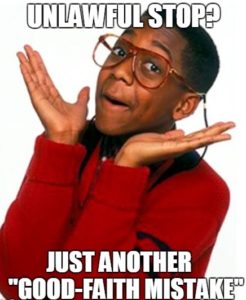In yesterday’s Utah v. Strieff, five of the eight members of the Supreme Court held the existence of an arrest warrant for someone a police officer unlawfully stops sufficiently “attenuates” the taint of the illegal stop, at least where the stop is not “flagrantly” unconstitutional.
Based on an anonymous tip, a South Salt Lake City police detective conducted “intermittent surveillance” of a house to see if it was being used to sell drugs. He saw people leave “a few minutes after arriving at the house,” and this “raise[d] his suspicion that the occupants were dealing drugs.” One day he saw Strieff leave the house; he followed Strieff on foot and stopped him. When he got Strieff’s ID card and relayed the information to a colleague, he discovered “Strieff had an outstanding arrest warrant for a traffic violation.” The detective then arrested Strieff and searched him, finding drugs in his pocket. The Utah Supreme Court unanimously ruled the drugs were the fruit of an illegal stop and thus subject to the exclusionary rule.
Justice Thomas, writing for the U.S. Supreme Court majority, disagreed. As the parties had never disputed that the stop lacked reasonable suspicion and thus violated the Fourth Amendment, the majority “assume[d] without deciding” that the stop was illegal. It nonetheless held the drugs were admissible under the attenuation doctrine, which applies where “the connection between unconstitutional police conduct and the evidence is remote or has been interrupted by some intervening circumstance.” Conceding the connection here was not remote — the detective “discovered drug contraband on Strieff ’s person only minutes after the illegal stop” — the majority held the two other factors relevant in an attenuation inquiry weighed against suppression. First, the existence of Strieff’s arrest warrant was an “intervening circumstance.” Second, the illegal stop was not “purposeful or flagrant.”
The detective “was at most negligent,” the majority said, having made “two good-faith mistakes. First, he . . . lacked a sufficient basis to conclude that Strieff was a short-term visitor who may have been consummating a drug transaction. Second, because he lacked confirmation that Strieff was a shortterm visitor, [he] should have asked Strieff whether he would speak with him, instead of demanding that Strieff do so. . . . But these errors in judgment hardly rise to a purposeful or flagrant violation of Strieff’s Fourth Amendment rights.”
Justices Ginsburg, Sotomayor and Kagan dissented. “Writing only for [her]self,” Justice Sotomayor explained that “unlawful ‘stops’ have severe consequences much greater than the inconvenience suggested by the name. This Court has given officers an array of instruments to probe and examine you. When we condone officers’ use of these devices without adequate cause, we give them reason to target pedestrians in an arbitrary manner. We also risk treating members of our communities as second-class citizens.” This “case tells everyone, white and black, guilty and innocent, that an officer can verify your legal status at any time. It says that your body is subject to invasion while courts excuse the violation of your rights. It implies that you are not a citizen of a democracy but the subject of a carceral state, just waiting to be cataloged.”
“We must not pretend that the countless people who are routinely targeted by police are ‘isolated.’ They are the canaries in the coal mine whose deaths, civil and literal, warn us that no one can breathe in this atmosphere. They are the ones who recognize that unlawful police stops corrode all our civil liberties and threaten all our lives. Until their voices matter too, our justice system will continue to be anything but.”

